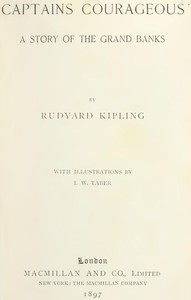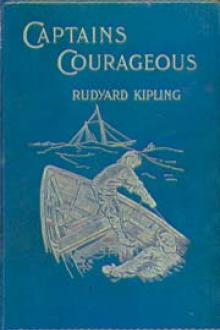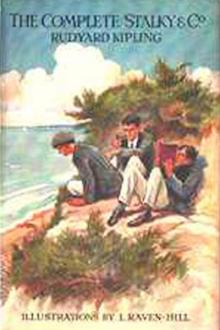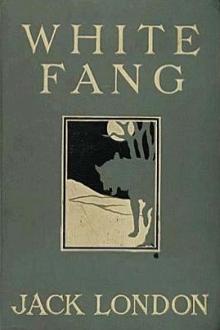"Captains Courageous": A Story of the Grand Banks by Rudyard Kipling (books for 6 year olds to read themselves txt) 📗

- Author: Rudyard Kipling
Book online «"Captains Courageous": A Story of the Grand Banks by Rudyard Kipling (books for 6 year olds to read themselves txt) 📗». Author Rudyard Kipling
They drifted along the line of seats made gay with the dresses of the summer boarders, and one of the town officials patrolled and perspired till he shone all over with pure civic pride. Cheyne had met him for five minutes a few days before, and between the two there was entire understanding.
"Well, Mr. Cheyne, and what d'you think of our city?—Yes, madam, you can sit anywhere you please.—You have this kind of thing out West, I presume?"
"Yes, but we aren't as old as you."
"That's so, of course. You ought to have been at the exercises when we celebrated our two hundred and fiftieth birthday. I tell you, Mr. Cheyne, the old city did herself credit."
"So I heard. It pays, too. What's the matter with the town that it don't have a first-class hotel, though?"
"Right over there to the left, Pedro. Heaps o' room for you and your crowd.—Why, that's what I tell 'em all the time, Mr. Cheyne. There's big money in it, but I presume that don't affect you any. What we want is—"
A heavy hand fell on his broadcloth shoulder, and the flushed skipper of a Portland coal-and-ice coaster spun him half round. "What in thunder do you fellows mean by clappin' the law on the town when all decent men are at sea this way? Heh? Town's dry's a bone, an' smells a sight worse sence I quit. 'Might ha' left us one saloon for soft drinks, anyway."
"Don't seem to have hindered your nourishment this morning, Carsen. I'll go into the politics of it later. Sit down by the door and think over your arguments till I come back."
"What good's arguments to me? In Miquelon champagne's eighteen dollars a case, and—" The skipper lurched into his seat as an organ-prelude silenced him.
"Our new organ," said the official proudly to Cheyne. "Cost us four thousand dollars, too. We'll have to get back to high-licence next year to pay for it. I wasn't going to let the ministers have all the religion at their convention. Those are some of our orphans standing up to sing. My wife taught 'em. See you again later, Mr. Cheyne. I'm wanted on the platform."
High, clear, and true, children's voices bore down the last noise of those settling into their places.
"O all ye Works of the Lord, bless ye the Lord: praise him, and magnify him for ever!"
The women throughout the hall leaned forward to look as the reiterated cadences filled the air. Mrs. Cheyne, with some others, began to breathe short; she had hardly imagined there were so many widows in the world; and instinctively searched for Harvey. He had found the "We're Heres" at the back of the audience, and was standing, as by right, between Dan and Disko. Uncle Salters, returned the night before with Penn, from Pamlico Sound, received him suspiciously.
"Hain't your folk gone yet?" he grunted. "What are you doin' here, young feller?"
"O ye Seas and Floods, bless ye the Lord: praise him, and magnify him for ever!"
"Hain't he good right?" said Dan. "He's bin there, same as the rest of us."
"Not in them clothes," Salters snarled.
"Shut your head, Salters," said Disko. "Your bile's gone back on you. Stay right where ye are, Harve."
Then up and spoke the orator of the occasion, another pillar of the municipality, bidding the world welcome to Gloucester, and incidentally pointing out wherein Gloucester excelled the rest of the world. Then he turned to the sea-wealth of the city, and spoke of the price that must be paid for the yearly harvest. They would hear later the names of their lost dead—one hundred and seventeen of them. (The widows stared a little, and looked at one another here.) Gloucester could not boast any overwhelming mills or factories. Her sons worked for such wage as the sea gave; and they all knew that neither Georges nor the Banks were cow-pastures. The utmost that folk ashore could accomplish was to help the widows and the orphans; and after a few general remarks he took this opportunity of thanking, in the name of the city, those who had so public-spiritedly consented to participate in the exercises of the occasion.
"I jest despise the beggin' pieces in it," growled Disko. "It don't give folk a fair notion of us."
"Ef folk won't be fore-handed an' put by when they've the chance," returned Salters, "it stands in the nature o' things they hev to be 'shamed. You take warnin' by that, young feller. Riches endureth but for a season, ef you scatter them araound on lugsuries—"
"But to lose everything—everything," said Penn. "What can you do then? Once!"—the watery blue eyes stared up and down, as looking for something to steady them—"once I read—in a book, I think—of a boat where every one was run down—except some one—and he said to me—"
"Shucks!" said Salters, cutting in. "You read a little less an' take more int'rust in your vittles, and you'll come nearer earnin' your keep, Penn."
Harvey, jammed among the fishermen, felt a creepy, crawly, tingling thrill that began in the back of his neck and ended at his boots. He was cold, too, though it was a stifling day.
"'That the actress from Philadelphia?" said Disko Troop, scowling at the platform. "You've fixed it about old man Ireson, hain't ye, Harve? Ye know why naow."
It was not "Ireson's Ride" that the woman delivered, but some sort of poem about a fishing-port called Brixham and a fleet of trawlers beating in against storm by night, while the women made a guiding fire at the head of the quay with everything they could lay hands on.
"They took the grandam's blanket, Who shivered and bade them go; They took the baby's cradle, Who could not say them no.""Whew!" said Dan, peering over Long Jack's shoulder. "That's great! Must ha' bin expensive, though."
"Ground-hog case," said the Galway man. "Badly lighted port, Danny."
"And knew not all the while If they were lighting a bonfire Or only a funeral pile."The wonderful voice took hold of people by their heartstrings; and when she told how the drenched crews were flung ashore, living and dead, and they carried the bodies to the glare of the fires, asking: "Child, is this your father?" or "Wife, is this your man?" you could hear hard breathing all over





Comments (0)